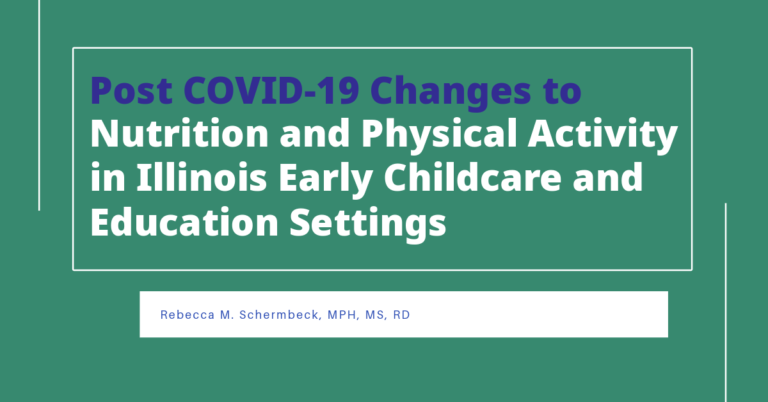
Following the COVID-19 pandemic, nutrition and physical activity best practices in Illinois early childhood care and education settings have declined.

Read the JPHMP article
Similar to schools, early care and education (ECE) settings can be the primary source of nutrition and physical activity for participants. ECE providers must meet both federal and state nutrition and physical activity requirements depending on the program in which the provider participates (e.g., Head Start or Child and Adult Care Food Program (CACFP)), but most guidance constitutes industry best practices for all providers. In 2019, our research team surveyed Illinois ECE providers about the nutrition and physical activity best practices implemented in their programs in anticipation of new licensing standards for day care homes and group homes that mirror the nutrition and physical activity requirements currently applicable to centers. Then the COVID-19 pandemic hit. The pandemic exacerbated the challenges ECE programs faced in providing quality child care, including nutrition and physical activity-related best practices. Our research team was uniquely positioned to capture and evaluate the new baseline/standard of nutrition and physical activity best practices for ECE providers in a follow-up survey. In our paper, “Changes in Nutrition and Physical Activity Practices in Illinois Early Childhood Care and Education Settings During the COVID-19 Pandemic,” we report these findings.
Following closures due to the COVID-19 pandemic, ECE programs faced serious challenges upon reopening. Staffing shortages deepened, supply chain issues emerged, and new safety measures were implemented. Waivers and emergency policies were introduced to mitigate the spread of the virus and reduce food insecurity for people who rely on federal food assistance programs delivered through ECE programs. Throughout all of this, nutrition and physical activity best practices declined. Illinois ECE programs reported serving more fried or pre-fried potatoes, fried or pre-fried meat, sweetened beverages, and cereals than before the pandemic began. They also used food more frequently than before to calm upset children or encourage appropriate behavior. In addition, young children reported spending more time sedentary and active than before the pandemic. The decline in best practice achievement was especially seen in centers compared to homes, and among ECE providers participating in CACFP and Head Start. The decline in CACFP-participating providers suggests that while federal child nutrition waivers were important in ensuring food security for low-income children during the pandemic, they may have had the unintended consequence of causing providers to provide lower quality meals and snacks.
COVID-19 changes to ECE programs have “resets” the baseline for nutrition and physical activity in these programs. Illinois is still waiting for new licensing standards for nutrition and physical activity to be promulgated. Once effective, ECE programs will likely need training and technical assistance to implement the new standards. ECE providers in the state will need to close larger gaps to regain and exceed the quality of nutrition and physical activity provided before the pandemic. For more information on nutrition and physical activity in Illinois, visit the Illinois Public Health Institute’s Illinois Physical Activity and Nutrition Program website at https://iphionline.org/ispan/. Additionally, our findings may be relevant not only in Illinois but nationally. Researchers can engage with ECE programs by conducting surveys and focus groups to identify where training and technical assistance are most needed. Our study “informs” the industry about the state of affairs in which many ECE programs are addressing nutrition and physical activity. This survey can help all ECE stakeholders understand how best their ECE programs can achieve at least previous best practices and work toward new licensing standards once they are available.
To learn more, read the article, “ Changing Nutrition and Physical Activity Practices in Illinois Early Childhood Care and Education Settings During the COVID-19 Pandemic ,” in our July 2024 issue. Journal of Public Health Management and Practice.
Acknowledgements
Yu Chen Lin, PhD, conducted the study while working as a research assistant at the University of Illinois at Chicago. Julien Leider, MA, is a senior research specialist at the Institute for Health Research and Policy at the University of Illinois at Chicago. Janna Simon is director of the Center for Policy and Partnership Initiatives at the Illinois Public Health Institute. Jamie F. Chriqui, PhD, MHS, is senior associate dean, professor of health policy and management in the School of Public Health at the University of Illinois at Chicago, and director of the Health Policy Institute at the Institute for Health Research and Policy.
Author Profile

-
Rebecca M. Schermbeck, MPH, MS, RD, is a Senior Research Specialist at the Institute for Health Research and Policy at the University of Illinois at Chicago. She has participated in numerous national surveys and qualitative studies on CACFP implementation, challenges, and facilitators.


